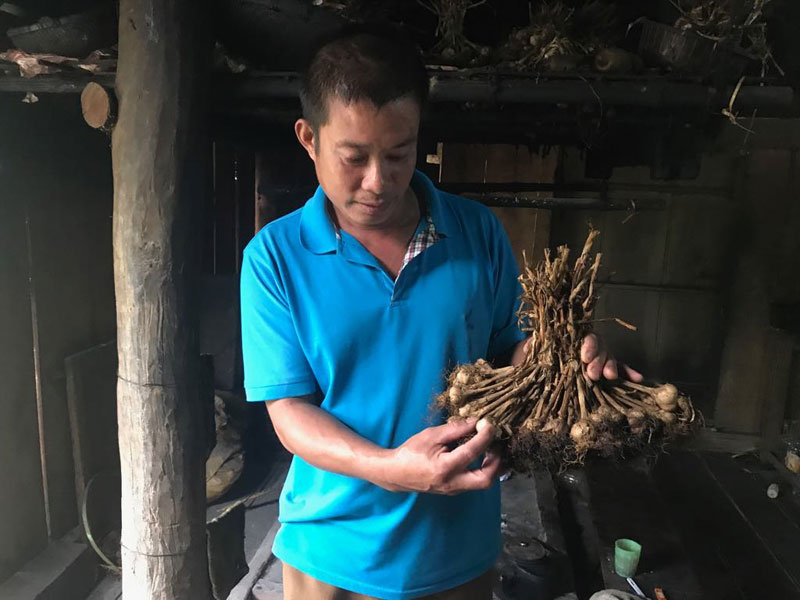
(HBO) – Each year, once the busy harvest season ends, farmers in Pu Bin commune of Mai Chau district, Hoa Binh province, start preparations to plant purple garlic. Making use of the cool mountainous climate, local residents have expanded the garlic planting area to raise their income.
Ha Cong Tin, a resident in
Na Phat hamlet of Pu Bin commune (Mai Chau district), stores dried garlic to
wait for prices to become more stable before selling the produce.
Purple garlic has a special taste and is also a
valuable herb curing many illnesses. Additionally, it suits local climate, so
residents in Pu Bin commune are farming this cash crop on a larger area.
The cultivation area reached 17ha in late 2017,
and it is expected to rise to 20ha this year and to continue to expanding in
the coming years. Na Phat and Bin communes have the largest garlic farming
area, over 10ha in total.
Ha Cong Tin, who has the largest garlic
cultivation area in Na Phat hamlet, said each year, after the harvest season,
his family will start to prepare soil for planting garlic. Last year, they
farmed 1,500 sq.m. of garlic and expanded the area to 2,000 sq.m. this year.
Garlic is easy to be cultivated and not vulnerable to diseases. Farming
techniques are simple as the plant needs little water and suits the local
climate, so it always grows well. He harvested nearly 400kg of garlic in last
year’s crop.
All households in Pu Bin commune have cultivated
garlic so far, from 40 sq.m. to 2,000 sq.m. each. Among them, Ha Cong Tin in Na
Phat hamlet plant 2,000 sq.m. of garlic while Dinh Cong Thang, a resident in
Bin hamlet, farms 1,800 sq.m.
Purple garlic of Mai Chau is favoured by
consumers thanks to its special good taste compared to other types of garlic in
the market. However, the sale of the local specialty remains unstable.
Kha Van Huong, head of Na Phat hamlet, said they
always meet difficulties in selling garlic. Because local residents live in a
mountainous region far away from urban areas, they have to bring garlic to
markets even before the dawn breaks and go back after the twilight, yet they
can sell only several kilogrammes of garlic.
If people fail to sell all garlic they bring
along, they can hang the produce above stoves to preserve and wait for higher
prices. However, garlic can only be stored for a short period of time as it may
sprout or become mouldy. If traders come to buy garlic at gardens, prices may
reach up to 50,000 VND (2.14 USD) per kg or drop to 15,000 – 20,000 VND (0.64 –
0.86 USD) per kg, Huong noted.
Dao Village’s honey – a product certified with a 3-star OCOP (One Commune One Product) rating by Thong Nhat Agricultural Cooperative in Dao Village (Hoa Binh City) – is highly regarded by consumers for its quality, richness, and variety in packaging. The distinctively sweet taste of Dao Village’s honey leaves a lasting impression on anyone who has tried it.
In alignment with Project No. 07-DA/TU, issued by the Hoa Binh provincial Party Committee on November 1, 2021, Lac Thuy district has actively promoted investment and supported the sustainable development of its industrial and handicraft sectors during the 2021–2025 period. Alongside this, the district has remained committed to preserving and revitalising traditional craft villages.
Located in the northern part of Lac Thuy district, with a temperate climate and fertile soil, Phu Thanh commune has great potential and advantages in growing tea. The long-standing experience, combined with strict adherence to organic farming practices in the tea gardens, ensures that the dried tea products from Phu Thanh and Lac Thuy as a whole are sold out immediately upon production, providing a stable and prosperous life for the local people.
Amid efforts to streamline the administrative apparatus, Hoa Binh province has intensified measures to address challenges in land clearance, resettlement support, and infrastructure investment, aiming to speed up the progress of key projects.
Hoa Binh province has posted an unprecedented economic growth rate of 12.76% in the first quarter of 2025, marking its highest quarterly performance to date and positioning it as the second fastest-growing locality in the country, trailing only Bac Giang province.
Under current regulations, products in the One Commune – One Product (OCOP) programme that are rated three stars or higher must undergo re-evaluation every three months. However, in reality, some of these products fail to consistently meet the required standards, raising concerns about the sustainability of their OCOP certification. This underscores the urgent need for producers to enhance product quality and gradually develop their OCOP products into strong, marketable brands.



